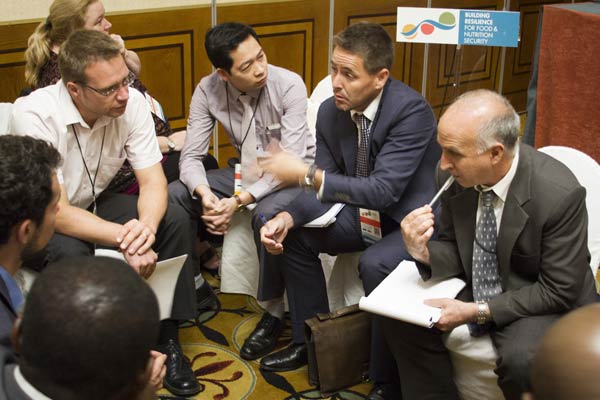Industrialization nourishes food security
China Daily, July 21, 2014 Adjust font size:

|
Participants at the recent IFPRI 2020 Conference on Building Resilience for Food and Nutrition Security in Addis Ababa, Ethiopia. CHINA DAILY |
Xu Shouzhi and his 12 colleagues are typical of many groups of Chinese workers operating across Africa today.
The 63-year old from Qingdao, in eastern Shandong province, is in Maputo, the capital of Mozambique, to build a cashew nut processing factory.
"It is exactly like our factory at home," he says.
"All you need to do is put cashews into this tunnel and they will come out cooked at the other end, and then they can be canned," he says.
He takes out a blueprint for the site and points to it proudly with his ballpoint pen.
"The whole cooking process is done by microwave - it's the very latest technology, and it comes straight from China."
Cashews remain a major agricultural export of Mozambique, and Xu's sparkling new production line allows the nuts to be cooked, canned and exported from there, instead of the cashew kernels having to be processed abroad.
According to Christian Mersmann, managing director of the Global Donor Platform for Rural Development, this emphasis on developing local production is much preferred to straight raw food exports from Africa. Along with local jobs and income, it also delivers what is still considered one Africa's key needs when it comes to its agricultural sector and nutritional security.
Mersmann's Germany-based organization has become a mainstream platform for donors and partners to exchange knowledge and coordinate efforts to improve the quality of global rural development.
During the recent "Building Resilience for Food &Nutrition Security" conference in Addis Ababa, Ethiopia, he told China Daily that Africa remains the most fragile continent when it comes to food security.
Organized by the US-based International Food Policy Research Institute - which since 1975 has sought what it calls "sustainable solutions for ending hunger and poverty" - the three-day event attracted more than 800 policymakers, practitioners and scholars to discuss how Africa's food and nutrition security can be strengthened.

